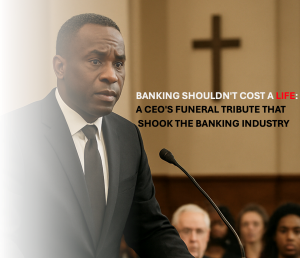
The High Price of Banking: A Call for Change
The funeral of a banker named Nana has ignited a fierce debate about the demanding and often unsustainable working conditions within the banking sector. Theocharis, CEO of Apogee Bank, used his tribute to Nana, a former colleague, to deliver a scathing critique of a system he says prioritizes profits and targets over the well-being of its employees.
Theocharis's words painted a grim picture of young professionals routinely working far beyond their contracted hours, sacrificing their health and personal lives in the pursuit of relentless targets. He argued that Nana's sudden death from cardiac arrest was not simply a personal tragedy, but a direct consequence of a system that abuses dedication and ignores the silent cries of its workforce.
"Enough is Enough": A CEO Speaks Out
"Banks are not hospitals," Theocharis declared, challenging the industry's acceptance of grueling schedules and unrealistic expectations. He questioned the necessity of pre-dawn meetings and late-night deadlines, pointing out that delaying a meeting or a report by a few hours would not lead to catastrophe, but could save lives.
Theocharis urged leaders to consider whether they would subject their own children to the same conditions they impose on their employees. He called for a fundamental shift in values, emphasizing that employees are human beings, not machines, and that their health and dignity must be protected.
The Interview: Exposing the Exploitation
Following the funeral service, Theocharis elaborated on his concerns in an interview, pulling no punches in his assessment of the situation. He described the practices in many banks as "nothing short of abuse," highlighting the discrepancy between the eight-hour workday stipulated in employment contracts and the reality of employees regularly working 10, 12, or even more hours per day.
He cited instances of employees staying at the office until the early hours of the morning, only to be expected back at work before dawn. Theocharis dismissed the notion that this was simply dedication, labeling it instead as exploitation.
The Health Crisis: Beyond Overtime
Theocharis also addressed the health implications of overwork, noting the rising cases of hypertension, diabetes, and heart conditions among bank employees. He referenced warnings from the World Health Organization about the increased risk of stroke and heart disease associated with working more than 55 hours a week.
Legal and Ethical Concerns
Theocharis pointed out that the Ghana Labour Act clearly limits work hours to eight per day and 40 per week, with overtime requiring compensation. He accused banks of circumventing the law by claiming that long hours are inherent to the nature of the business, while simultaneously failing to amend contracts to reflect this reality. He went so far as to call this practice "stealing from employees."
A Culture of Unnecessary Demands
Theocharis criticized the common practice of scheduling meetings at odd hours, often before dawn or late in the evening. He questioned the rationale behind these schedules, arguing that they serve no purpose other than to burden employees unnecessarily.
A Challenge to Leadership
Theocharis condemned bank leaders who insist that employees should "toughen up" as part of building a career. He challenged them to consider whether they would want their own children subjected to such conditions, accusing them of sacrificing young professionals because they lack alternatives. He argued that this is not career growth, but a form of slow destruction.
The Potential for Legal Repercussions
Theocharis predicted that the continued abuse of employees would eventually lead to legal action, drawing a parallel to the #MeToo movement. He warned that employees would eventually band together to sue banks for contract abuse, labor violations, and human rights breaches. He cautioned boards, regulators, and HR managers against turning a blind eye, warning that they could face severe consequences.
A Call for Immediate Change
Theocharis outlined three immediate changes that he would like to see implemented:
- Respect the law: Adhere to the eight-hour workday unless overtime is fairly compensated.
- Schedule meetings within reasonable hours.
- Prioritize employee welfare and make it a central part of the corporate culture.
Apogee Bank's Approach: People Before Profits
Theocharis highlighted Apogee Bank's commitment to putting people before profits. He explained that the bank has implemented strict working-hour policies, wellness programs, and safety measures for late shifts. He presented Apogee Bank as proof that it is possible to run a profitable bank without exploiting employees.
Leadership in Question: The Unanswered Dilemma
Theocharis's statements raise a fundamental question about leadership in the modern financial world: Should banks continue to pursue aggressive targets at any human cost, or should they prioritize the well-being of their employees, even if it means moderating short-term gains?
His reforms at Apogee Bank, including strict eight-hour policies, wellness programs, and safety protocols, demonstrate a commitment to the latter approach.
Key Lessons for Banks and Financiers
- Compliance with Labour Laws is Essential: Ignoring legal limits on work hours can lead to lawsuits, fines, and reputational damage.
- Employee Health is Directly Linked to Financial Health: Preventing burnout and chronic illnesses is more cost-effective than treating them.
- Meeting Culture Needs to Evolve: Rescheduling late-night and pre-dawn calls to within work hours can improve morale without harming productivity.
- Empathy is a Crucial Leadership Skill: Leaders must consider whether they would want their own children subjected to the same conditions they impose on their employees.
- Long-Term Profitability Depends on People: Motivated and healthy employees drive sustained growth, while exploited employees may only deliver short-term gains.
The story of Nana serves as a stark reminder of the human cost of prioritizing profit over people. It remains to be seen whether the banking industry will heed Theocharis's call for change and create a more sustainable and humane working environment for its employees.



No comments:
Post a Comment